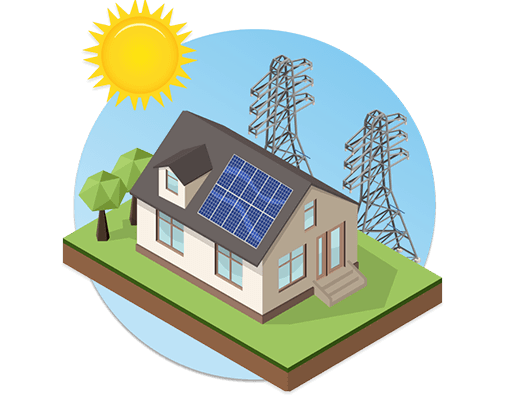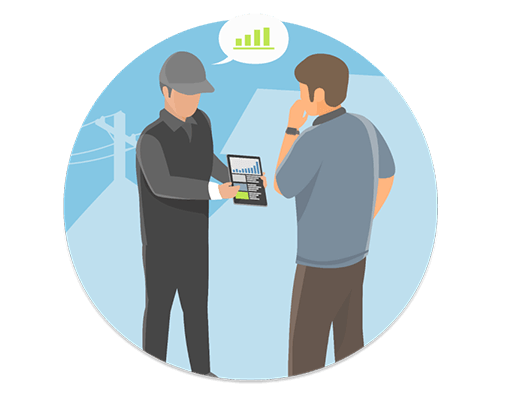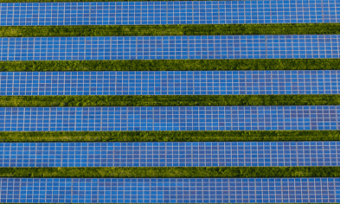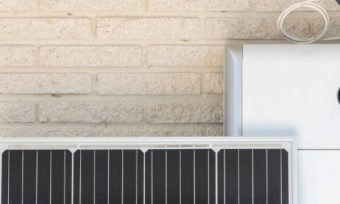Solar energy is a form of renewable energy. It’s most commonly created by using photovoltaic (PV) solar panels and an inverter to convert light from the sun into electricity that can be used in your home, either as an alternative or supplement to the electricity you buy from an energy provider and receive from the electricity grid. Another type of solar energy is created with a solar thermal system that turns sunlight into heat for home heating or a hot water system. More than 30% of Australian households have a solar PV system installed on the roof of their house, according to the Australian Renewable Energy Agency.
Learn more
Advertisement
Solar energy is touted as a great power alternative for households that want to cut their energy bills and use a more sustainable form of energy. A home solar system allows you to potentially reduce the amount of electricity you buy from an energy retailer, by using a solar system to produce electricity for use in the home – with lower electricity bills as a result.
Solar energy also offers you the potential to reduce the amount of carbon emissions you’re responsible for. This is because solar energy generation produces fewer emissions than the energy generation using fossil fuels that supplies most of the electricity on the electricity grid. Solar energy comes with some downsides, however: these include its relatively high upfront cost, and that the process for recycling solar panels – which is sometimes argued as the flipside to the environmental friendliness of solar energy – isn’t yet straightforward.
We’ve listed the key pros and cons of solar power below to help you weigh up your options.
Pros
Cons
Solar panels work by absorbing sunlight and converting it into electricity through what’s called the photovoltaic effect (PV). ‘Photovoltaic’ is a word that refers to the conversion of light into electricity using a certain type of material.
In terms of solar systems, it means that when sunlight hits the solar PV cells made of silicon, a reaction occurs that releases electrons. Panel manufacturers also typically infuse the silicon in the PV cell with minerals called phosphorus and boron to create an electric field inside the cell. The electrons released by the sunlight are forced by the electric field out of the cell: they are then collected by electricity-conducting metal surrounding the PV cell and connecting it to the other PV cells in the panel. Electrons moving in the same direction are, effectively, an electrical current.
The electrical current created in the solar panel is a direct electrical current. That direct current (DC) is transported by wires to a solar inverter, which converts it into the alternating current (AC) that you use to power your home.
You no doubt know that solar power is energy generated by the sun. However, to capture that energy, you require photovoltaic, or PV, solar panels on your roof. Ensure you use a licensed professional, such as the solar installers rated by Canstar Blue, to install these solar panels.
You also require a solar inverter to convert the direct current, or DC, electricity from the panels into alternating current, or AC, electricity for use in your home. Unused electricity can be stored in a solar battery or sold back to the energy grid in return for a feed-in tariff.
Be aware that purchasing a solar system can be expensive, even when the cost is partly offset by government rebates. Before you make that expenditure, learn more about whether it’ll benefit your finances by reading the wealth of solar information on Canstar Blue.
An inverter is a device that converts the electricity generated by a solar panel or stored in a solar battery from its DC form into an AC form. This electricity is then suitable for use in your home, or can be exported to the electricity grid in return for a feed-in tariff (FiT).
Solar inverters come in six varieties – from solar battery-compatible to off-grid ready – and usually cost from $1,000 to $2,000, but that cost is often part of the purchase price of your solar system.
Your solar installer will recommend the best inverter for your household’s energy needs but there are some considerations worth keeping in mind when choosing an inverter. These are:
Whether you need a solar battery depends on the outcomes you expect from your solar system. A solar battery acts as a storage system for the electricity generated by your solar panels, so you can use it to power your home at times when you would otherwise have to use electricity from the grid. Such a time could be in the evening, when your solar panels aren’t producing electricity for you to use immediately and grid electricity tends to be in greater demand (and therefore more expensive).
Without a battery to store the electricity your panels generate during daylight hours, that power is used for any immediate electricity needs in your home at the time of generation. Any excess electricity is then exported to the electricity grid in return for a FiT. In comparison, a battery gives you the option of storing that excess electricity instead for your own use. Most solar batteries store electricity in the DC form, so you may still need an inverter to convert that electricity to AC for use at home.
You might choose to install a solar battery to reduce or even eliminate your reliance on the grid. Another common reason to install a battery is that you may have an electricity plan with a time-of-use tariff; storing electricity in a battery could allow you to use that power during peak times when grid energy is more expensive. A downside of solar batteries, however, is that a battery of sufficient size to support most homes’ electricity needs is quite expensive – think $10,000 or more.

The cost of solar will vary depending on a number of factors, including your geographical location, the size of your system, quality of products used, installer used, government rebates accessed and financing options. These costs are generally broken out into the solar panel, solar inverter and overall installation costs. Some installers may offer these as a package, while others may break them down into separate items in their quote.
According to a Canstar Blue survey conducted in December 2023, the average cost of solar panels and an inverter was $5,796, with average installation costs at $1,503. The average solar package was found to be $6,147. For a solar cost estimate for your home, it’s advisable to get a detailed quote that’s specific to your property and electricity needs from an accredited, licensed solar installer.
To choose the best solar panels for your home in Australia, pay close attention to factors such as the cost, quality, sustainability and efficiency of the panels on offer. That the panels are available from your preferred solar installer is also a consideration, because few installers offer every single brand and type of solar panel available. The warranty available on both the products and workmanship of your solar panel may also be something to consider when choosing the best panels for your home – you’ll want peace of mind that you are covered if something happens to your system once it’s up and running.
Choosing the best solar panels for your home involves all of the consideration you would give to any substantial purchase: cost, quality, availability and warranty.
But in particular, the panels you choose should also be the ones that are best suited to your home electricity needs. They should also suit your home itself: this can determine the size of panels you can use. You should also factor in your intentions in regard to how much you wish to rely on your solar system for energy support and how long you will remain at the property where you install the panels. Accredited, qualified installers can provide great information on what panels are available that might meet your unique combination of requirements.
There are two main components of a solar electricity plan to consider: the usage and supply rates, and the solar feed-in tariff (FiT) These components and how you intend to use the electricity your solar system generates will determine the plan you choose.
If your solar panels meet only a small portion of your household’s daily electricity use each day, you may need to consider an electricity plan that offers a decent electricity usage rate . This is because it’s more likely you’ll still rely on grid electricity to meet a significant amount of your electricity needs.
If you have a larger solar system that’s generating more electricity than your household needs each day, you may wish to consider a power plan with a higher solar FiT instead. This will mean you get a good amount of credit on your electricity bill in exchange for exporting your excess solar energy back to the grid.
If you have a solar battery attached to your solar panel system, you could use either of the above options, depending on how you use your storage. You might want to store the electricity your panels generate to export for a relatively generous FiT at a later date. You could also use that electricity to power your home during non-daylight hours to avoid paying for grid electricity when your panels aren’t generating power. The first option may mean you take advantage of a plan with a higher FiT, while the second would likely benefit more from a plan with lower usage rates.
No matter which plan you choose, you should always keep an eye on the designated supply charge it includes. This is a daily fee that you must pay as long as you’re connected to the grid, and so contributes to the overall cost of your energy plan.
Getting the right professional advice and work can make all the difference when you are getting started with solar. But how do you find the right solar pro for the job? Firstly, it’s important to understand the difference between a solar retailer and a solar installer. A solar retailer is responsible for the procurement, sale and arrangement of a solar system, either by its own employees or by using a contractor. A solar installer does as you’d expect – not just ‘retail’ or market and sell solar systems, but install them or oversee their installation too. Some businesses and individuals are both: the Clean Energy Council helps explain the difference between solar retailers and solar installers.
No matter whether you choose a retailer or an installer, there are a few key things to consider when choosing the right person or company to get your solar installed.

If you aren’t sure where to start when looking for a quality solar installer, check Canstar Blue’s solar installer ratings to see which large retailers and installers other Australian solar buyers rated.
Here are some of the cheapest solar-specific deals from the retailers on our database. These costs are based on the Ausgrid network in Sydney but prices will vary depending on your circumstances. We show one product per retailer, listed in order of lowest price first. Annual price estimates assume general energy usage of 3900kWh/year for a residential customer on a single rate tariff. Price estimates exclude solar feed-in tariff credits. These are products from referral partners†. Our database may not cover all deals in your area, and please check retailer websites for up to date information.
Here are some of the cheapest solar-specific deals from the retailers on our database. These costs are based on the Citipower network in Melbourne but prices will vary depending on your circumstances. We show one product per retailer, listed in order of lowest price first. Annual price estimates assume general energy usage of 4000kWh/year for a residential customer on a single rate tariff. Price estimates exclude solar feed-in tariff credits. These are products from referral partners†. Our database may not cover all deals in your area, and please check retailer websites for up to date information.
Here are some of the cheapest solar-specific deals from the retailers on our database. These costs are based on the Energex network in Brisbane but prices will vary depending on your circumstances. We show one product per retailer, listed in order of lowest price first. Annual price estimates assume general energy usage of 4600kWh/year for a residential customer on a single rate tariff. Price estimates exclude solar feed-in tariff credits. These are products from referral partners†. Our database may not cover all deals in your area, and please check retailer websites for up to date information.
Here are some of the cheapest solar-specific deals from the retailers on our database. These costs are based on SA Power network in Adelaide but prices will vary depending on your circumstances. We show one product per retailer, listed in order of lowest price first. Annual price estimates assume general energy usage of 4000kWh/year for a residential customer on a single rate tariff. Price estimates exclude solar feed-in tariff credits. These are products from referral partners†. Our database may not cover all deals in your area, and please check retailer websites for up to date information.

August 13th
Keep up to date with new electricity plans, rates and discounts with Canstar Blue. We compare energy prices across NSW, QLD, VIC and SA.
– Read more
What’s a solar farm and how does it power your home? Learn more and see a list of solar farms in Australia at Canstar Blue.
– Read more
Canstar Blue reveals the average bill for households with solar in Australia. See costs and solar billing tips inside.
– Read more
What is the sun tax and how does it affect households with solar? Canstar Blue explains what the sun tax means for solar exports and bills.
– Read more
Learn how to connect solar panels to a solar battery safely and effectively with the help of a licensed solar installer.
– Read more
Tara Donnelly is Canstar Blue’s Utilities Editor, leading the team that focuses on energy, telecommunications and consumer technology, across news, reviews and how-tos. Tara has spent more than a decade covering these topics in Australia, the US and Canada, which means she’s written about countless product launches and industry changes, including the rise of 5G, Australia’s ongoing NBN rollout, the recent years of energy price volatility and the rise of renewable energy sources.
Tara also has long experience in writing within the comparison industry, giving her great insights into the information consumers want when determining which plan or device will best meet their needs, while time spent in the financial sector before turning her talent to content lets her crunch the numbers on price with ease. Tara leads the coverage of Canstar Blue’s ratings and awards for the internet and phone sectors and is an expert at advising consumers on how to use comparison tools to find the best power, internet or phone deal.
Her expertise has seen her appear in national media including 9 News, 7 News, Sunrise, the ABC and The Sydney Morning Herald.
Tara has a Bachelor of Communications from the University of Canberra and is passionate about simplifying complex subjects so consumers aren’t just informed, they’re connected and confident.
You can follow Tara on LinkedIn and Twitter and read more of Tara’s published articles.
 Katrina Hasdell is an Energy Content Producer at Canstar Blue, where she covers Australia’s retail energy market. Katrina is dedicated to providing consumers with easy-to-read information on their energy options so they can get better deals on electricity, solar power and more.
Katrina Hasdell is an Energy Content Producer at Canstar Blue, where she covers Australia’s retail energy market. Katrina is dedicated to providing consumers with easy-to-read information on their energy options so they can get better deals on electricity, solar power and more.
She previously wrote content for Australia’s leading home services company, Pulse Home Services, while completing her BA in professional writing and publishing at Curtin University. When she’s not working, you’ll find Katrina with her nose in a book or playing a story-fueled videogame.
You can read more of Katrina’s published articles.
Meet the Editorial Team
Bachelor of Commerce (Economics & Finance), Griffith University. Graduate Certificate in Data Science with Distinction, RMIT. Master of Data Science, Strategy and Leadership with Distinction, RMIT

Josh Sale leads Canstar’s research and product data functions that provide the basis for Canstar’s and Canstar Blue’s comparison tools, Value Rank calculations and expert Star Ratings, with oversight of teams of researchers, business analysts and data analysts across the energy, telecommunications and financial services and products sectors. Josh’s mix of tertiary qualifications in economics and finance and long experience as a Canstar company spokesperson means he’s not only able to transform complex calculations into consumer-friendly tools, rankings and awards, but is able to communicate them in a way that addresses Australians’ real-life personal finance and purchasing concerns.
Josh has analysed consumer markets in energy and telecommunications, and is keenly interested in what constitutes innovative products and services in those sectors. He regularly advises on bespoke research projects to continually improve Canstar and Canstar Blue’s understanding of consumer purchasing and use behaviour across energy and telco and is particularly interested in expanding the use of AI to provide consumers with information more quickly and efficiently.
Josh has shared his insights in print, radio and broadcast interviews with the likes of the Australian Financial Review, news.com.au and Money magazine because he believes knowledge is the first step toward empowerment. To the same end, while studying he facilitated peer-assisted study sessions for economics, and represented his University’s Business School in an academic committee.
When he’s not looking for new ways to leverage Canstar’s and Canstar Blue’s huge warehouse of product data and deep research expertise, Josh likes to research his own purchases in depth – just ask him about how he narrowed down his search for the perfect TV! Josh also uses his personal time to disappear down AI rabbit holes, when he’s not being a hands-on parent to two littlies.
Connect with Joshua Sale on Linkedin.
Bachelor of Business (Finance) with Distinction & Bachelor of Mathematics (Applied Computational Modelling) with Distinction, QUT

Breanna Gream is Canstar’s Data Insights Team Lead, responsible for developing the methodology and delivering Canstar Blue’s Value Ranking and determining Outstanding Value award winners for the energy and telecommunications sectors. Breanna completed a double Bachelor’s degree in Business, majoring in Finance, and Mathematics, majoring in Applied Computational Modelling, at the Queensland University of Technology.
Breanna enjoys using her skills to help consumers find more suitable utilities plans by transforming complex calculations into a Value Rank that provides a simpler way to compare different products. She most recently developed Value Ranking methodologies for wireless broadband plans and solar energy plans, to make it easier for households to identify plans that provide good value not just in terms of prices but also the features they offer. Breanna’s work on Value Ranking plays a key part in determining the winners of Canstar Blue’s Outstanding Value awards for electricity, gas, solar, phone and internet brands.
Many of the articles published by Canstar Blue feature calculations also undertaken by Breanna and her team, which converts pricing data into easy-to-understand cost forecasts and average price information for readers.
During her time at Canstar Blue, Breanna has developed an in-depth knowledge of product, market and regulatory changes across the electricity, solar, gas, internet and phone sectors, and particularly likes keeping Canstar Blue’s methodologies up to date and reflective of the ever-changing utilities environment.
When Breanna’s not crunching data, she’s likely to be somewhere remote – two of her favourite things to do are hiking and mountain climbing.
Connect with Breanna Gream on LinkedIn.
Meet the Research Team